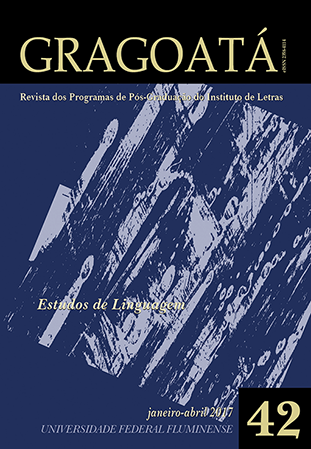Ethnicity in motion? German language islands in Brazil and Russia
DOI:
https://doi.org/10.22409/gragoata.v22i42.33462Palavras-chave:
Ilhas linguísticas. Contato linguístico. Mudança linguística. Revitalização linguísticas.Resumo
Today, German language islands in Russia and Brazil are on the way to language shift. On this way, the varieties of these communities display certain features of decomposition and simplification in terms of morphology. Regular and irregular morphology, however, are developing differently: while case reduction is the main characteristic of regular noun inflection, in personal pronouns case distinctions are maintained. Results are presented from a research project about language change in case morphology of German language islands with 125 speakers living in close contact to the majority populations in Brazil and Ruguage obsolescence as from language emergence which has been the subject of linguistic research in the past. Through its comparative perspective, it seems possible to accoussia. The core idea of the project is the assumption that we can learn as well from lannt for internally or externally induced linguistic change. Language decay is apparently not just disorder, not amorphous, but somehow structured. Certain lexical classes are more subject to reduction than others, and some residual features retain morphological “core” functions (in terms of case semantics). Language change is accelerated in times of blurring sociolinguistic differences and fading linguistic norms as an implication of losing ethnic boundaries. The recent co-officialization of minority languages in Brazil might slow down these processes. In a transcultural approach, teaching of Pomeranian as minority language (alongside the national language) could stabilize the local linguistic community, building a bridge to the High German standard language, and even to English as a lingua franca of international communication.
------------------------------------------------------------------------------------------------------
Etnicidade em movimento? Ilhas linguísticas germânicas no Brasil e na Rússia
As ilhas linguísticas existentes hoje na Rússia e no Brasil estão em processo de substituição. Desse modo, as variedades dessas comunidades apresentam certos traços de decomposição e simplificação no âmbito morfológico. No entanto, morfologias regular e irregular estão se desenvolvendo de modo diferente: enquanto a redução de caso é a maior característica da flexão nominal regular, as distinções de pronomes pessoais de caso são mantidas. Os resultados apresentados foram obtidos por meio de um projeto de pesquisa sobre mudança linguística em morfologia de caso de ilhas linguísticas germânicas, realizado com 125 falantes que vivem em estreito contato com as populações majoritárias do Brasil e da Rússia. A ideia central deste projeto é a suposição de que podemos aprender tanto com a obsolescência quanto com a emergência linguísticas, que já foram temas de pesquisas linguísticas no passado. Por meio de uma perspectiva comparativa, parece possível descrever mudanças linguísticas internamente ou externamente induzidas. Decadência linguística é, aparentemente, não só desordenada, não só amorfa, mas, de algum modo, estruturada. Certas classes lexicais são mais sujeitas à redução do que outras, e alguns traços residuais retêm funções morfológicas “centrais” (em termos de semântica de caso). A mudança linguística é acelerada em tempos de diferenças difusas e de enfraquecimento das normas linguísticas, como implicação de perda de fronteiras étnicas. A recente co-oficialização de línguas minoritárias no Brasil pode desacelerar esses processos. Em uma abordagem transcultural, o ensino do pomerano como língua minoritária (ao lado da língua nacional) poderia estabilizar a comunidade linguística local, construindo uma ponte para a variedade padrão do alemão e, até mesmo, para o inglês como língua franca de comunicação internacional.
---
Artigo em inglês.
---
DOI: http://dx.doi.org/10.22409/gragoata.2017n42a919
Downloads
Downloads
Publicado
Edição
Seção
Licença
AUTORIZAÇÃO
Autores que publicam em Gragoatá concordam com os seguintes termos:
Os autores mantêm os direitos e cedem à revista o direito à primeira publicação, simultaneamente submetido a uma licença Creative Commons Atribuição 4.0 Internacional (CC BY 4.0), que permite o compartilhamento por terceiros com a devida menção ao autor e à primeira publicação pela Gragoatá.
Os autores podem entrar em acordos contratuais adicionais e separados para a distribuição não exclusiva da versão publicada da obra (por exemplo, postá-la em um repositório institucional ou publicá-la em um livro), com o reconhecimento de sua publicação inicial na Gragoatá.
A Gragoatá utiliza uma Licença Creative Commons - Atribuição CC BY 4.0 Internacional.











